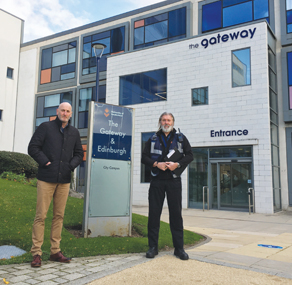“There has been a concerted effort, supported by the senior management team to create a new security culture, where rather than security being a background function, security is a prominent service that staff and students are aware of, understand it is there to assist them, and supports them to play their own part in keeping themselves and the organisation secure.”
That was taken from the report by the Secured Environments auditor, of the University of Sunderland campus. In the December 2020 print edition of Professional Security is a two-page interview with security manager Colin Ferguson and duty manager Martin Brewster (pictured left to right, photo courtesy of the University of Sunderland). We heard how the considerable and lengthy work they put in to gain the accreditation was but a marker of a wider restructure, that has parallels with other universities; and indeed how good security practice has changed beyond the campus too.
For as the head of the campus security managers’ association Aucso Trevor Jones – head of security at the University of Salford – reiterated in the November print edition, security on campus within the last few years has changed greatly, from pure and routine guarding of buildings – locking them at night, and unlocking them in the morning, as officers went on their rounds with a heavy bunch of keys – to more pastoral work, looking after the well-being of students and visitors, besides their physical safety. At many unis – at different times and paces – the change has been wide-ranging, in rosters, recruitment (seeking more women and younger officers, to better reflect the campus), the type and style of work – no more sitting all day in a gatehouse filling out car park passes – and a move towards offering security staff more varied and fulfilling work and a progression for the talented and ambitious.
Many of these topics were explored in the Sunderland article. While Secured Environments or any accreditation may sound like a dry subject, it proved anything but, for what changes were being certified; and the public recognition, which can also be a useful marketing tool as student safety – and low crime – can be a factor in deciding where a student chooses to study.
Even before the covid-19 pandemic, campuses had become competitive in terms of seeking students, and notably international students; and those students had turned into customers expecting good service, including support services such as site safety, besides academic. Hence Sunderland, like other unis, details online its ‘safety on campus‘.
For the article in December’s magazine, click here.
As background, the Secured Environments scheme is run by the consultancy Perpetuity Research on behalf of the UK police body Police Crime Prevention Initiatives (PCPI). It’s taken up by other sorts of sites, such as shopping centres and hospitals. Visit https://www.securedenvironments.com/. Another accreditation scheme, for UK universities, is Protect-ED, that covers besides an institution’s security, the overall well-being of students (including emotional and financial) and staff, safe nights out, and countering harassment.









